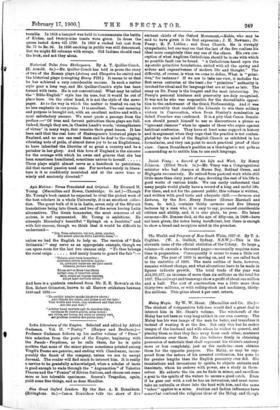eminent chiefs of the Oxford Movement,—gable, who may be said
to have given it its first expression ; J. H. Newman; Dr. Pusey ; H. P. Liddon ; and Dean Church. He is strongly sympathetic, but one may see that the last of the five realises his ideal more completely than any one of the others. His own con- ception of what Anglican Catholicism should be is one with which no possible fault can be found. " A Catholicism based upon the Apostolic primitive foundations, united with all the spring and ardour and expansiveness of modern life and thought." The difficulty, of course, is when we come to define, What is " primi- tive," for instance ? If we are to take one view, it includes the first seven centuries at the least ; for " primitive" authority is invoked for ritual and for language that are at least as late. The essay on Dr. Pusey is the longest and the most interesting. Dr. Pusey's personal kindness and generosity are duly recognised. It was not he who was responsible for the discreditable opposi- tion to the endowment of the Greek Professorship. And it was his neutrality that enabled the Liberals to win their solitary victory in Convocation, when Dean Stanley's nomination as Select Preacher was confirmed. It is a pity that Canon Donald- son should permit himself to use so discourteous a phrase as "ignorant clamour" when he speaks of those who argue against habitual confession. They have at least some support in history and in argument when they urge that the practice is not contem- plated by the mind of the English Church as exhibited in her formularies, and they can point to much practical proof of their view. Canon Donaldson's position as a theologian is not quite so commanding as to entitle him to use such language.






































 Previous page
Previous page